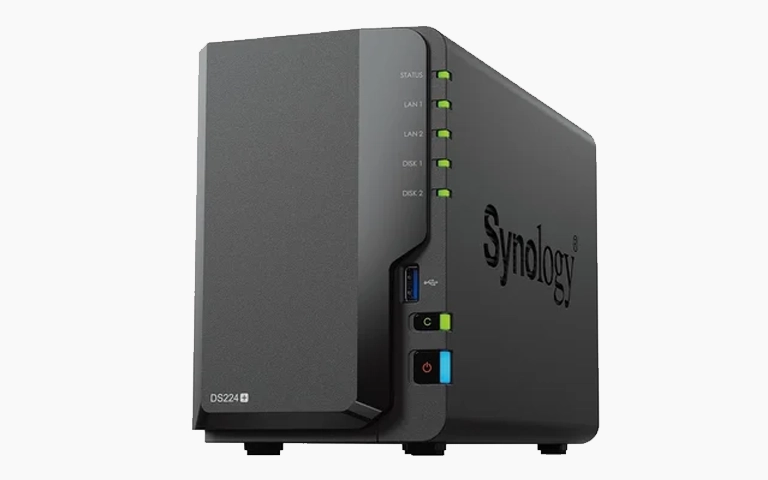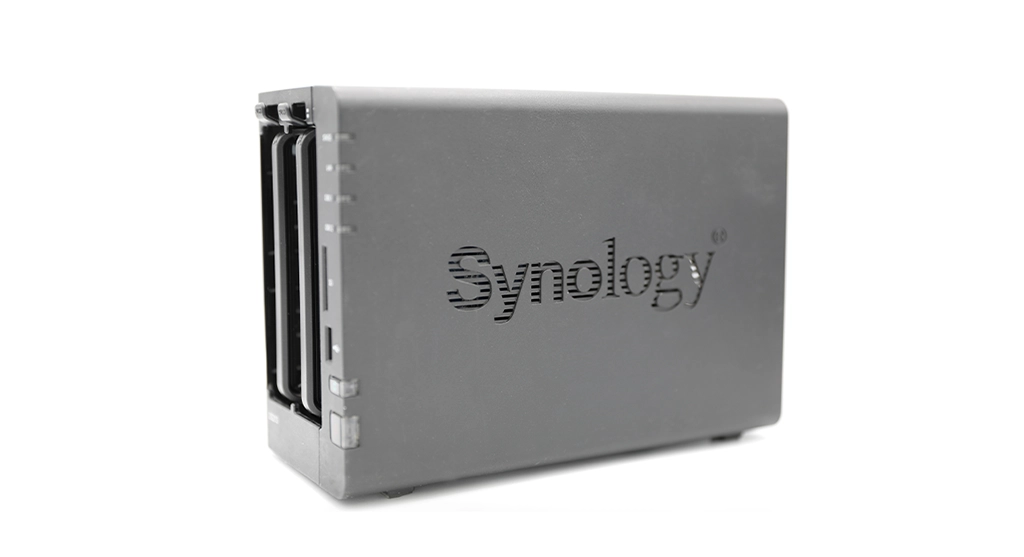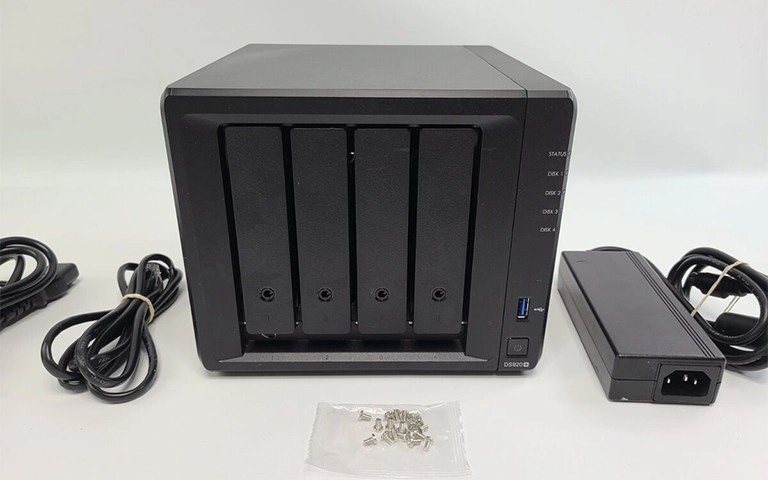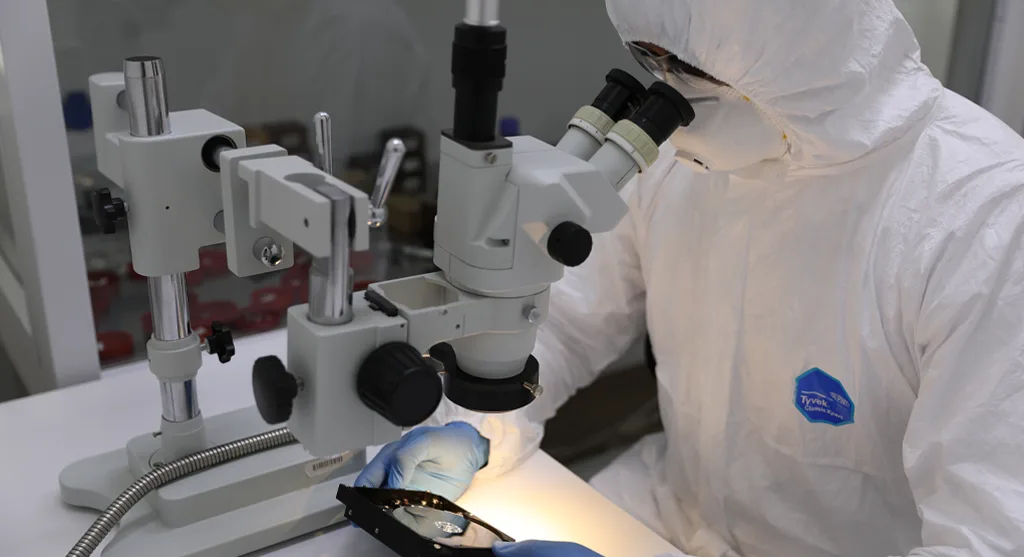A blinking blue light on your Synology NAS can be confusing and concerning, especially if it suddenly appears when you try to power on your system. While this light often signals that the device is starting up, it can also indicate an underlying issue preventing your NAS from booting properly.
In this blog, we’ll explain what the blinking blue light really means, explore the most common causes, and share safe troubleshooting steps you can take. If the issue persists, we’ll also guide you on when it may be time to seek professional support.

Why Your Synology NAS Shows a Blinking Blue Light
On Synology NAS devices, the blue power LED is designed to show the system’s status. When it blinks, it typically means the NAS is in the process of powering on. This stage normally lasts only a short time before the system becomes fully operational and the light turns solid.
If the blinking continues for an unusually long period, it may be a sign that the NAS cannot complete its boot sequence. This could be due to power-related issues, hardware faults, or problems with the system software. Understanding this behavior is the first step in resolving the problem safely.
What the Blinking Blue Light Really Means
The blinking blue light on a Synology NAS usually indicates that the device is in the process of starting up. Under normal circumstances, the light will turn solid blue once the system finishes booting.
However, if the blinking continues without changing, it often points to a problem in the boot process. This may involve the power supply not delivering stable current, corrupted firmware, or the system failing to initialize its hardware correctly.
In short, the blinking blue light can either be a normal part of startup or an early warning sign of something more serious.

Common Causes of the Blue Light Problem
When the blinking blue light doesn’t stop, it’s usually linked to one of a few common issues:
Power supply problems: A faulty or incompatible power adapter may not deliver stable voltage, preventing the NAS from completing startup. This is one of the most frequent and easiest-to-overlook causes.
Firmware or DSM corruption: Interrupted updates, sudden power outages, or file corruption can leave the DiskStation Manager unable to load. The NAS keeps trying to start but never progresses past the blinking light.
Hardware faults: Issues with the motherboard, RAM, or even a failing disk can block the boot process. In some cases, you may also hear beeps or notice other LEDs flashing along with the blue light.
Connected devices: External USB drives, expansion units, or faulty peripherals sometimes interfere with the boot sequence, causing the system to hang at startup.
Understanding these root causes helps narrow down safe troubleshooting steps and prevents unnecessary risks.
Safe Troubleshooting Steps to Try
Before assuming the worst, there are several safe checks you can perform:
Check power connections: Ensure the power adapter and cable are original Synology components and properly connected. If possible, test with another compatible adapter.
Disconnect external devices: Remove USB drives or expansion units and restart the NAS. Conflicts from external devices are more common than many expect.
Restart the device: Power down completely by holding the power button, wait a few minutes, and power it back on. This clears temporary glitches.
Reseat hardware: If accessible, reseat RAM modules or hard drives to ensure proper contact. Poor connections can mimic hardware failure.
Reinstall DSM (with caution): If DSM corruption is suspected, reinstalling the operating system may restore functionality. Avoid repeating this process if it fails, as it can overwrite important configuration files.
These steps often resolve simple cases. If the problem persists, the cause may be deeper, and forcing additional resets or rebuilds can make recovery harder later.

When the Blinking Blue Light Doesn’t Go Away
If your Synology NAS still won’t move past the blinking blue light, the issue is often more serious. A failed power supply, corrupted DSM system files, or faulty hardware components may be to blame. At this stage, repeated DIY attempts can increase the risk of overwriting critical data.
Synology NAS systems often use complex configurations such as SHR, RAID 5, or RAID 6. These setups require careful handling, because improper troubleshooting may damage parity or striping information. Once that data is lost, recovery becomes much more difficult.
This is when professional help should be considered.
At RAID Recovery Services, we have the tools and expertise to diagnose Synology NAS failures and safely recover inaccessible data. Acting early is the best way to protect your information.
Fast turnaround times for business-critical data
Tips to Prevent the Issue in the Future
While some failures are unpredictable, you can lower the chances of seeing the blinking blue light again with a few preventive steps:
Use reliable power: Always connect your NAS to a surge protector or UPS to avoid power fluctuations.
Update DSM regularly: Keep the Synology operating system up to date to prevent firmware corruption.
Monitor hardware health: Check drive and system logs for early signs of failure.
Limit external devices: Only connect trusted USB drives or expansion units.
Maintain backups: Even with RAID protection, a separate backup ensures your files are safe if the NAS becomes unresponsive.
Taking these precautions helps keep your Synology NAS stable and reduces the risk of unexpected downtime.

Conclusion: Staying Prepared with Your Synology NAS
A blinking blue light on your Synology NAS can be harmless during startup or a sign of deeper issues if it persists. By understanding what it means, identifying the common causes, and following safe troubleshooting steps, you can often bring your system back online quickly.
If the problem doesn’t go away and your data is at stake, professional support is the safest path forward. RAID Recovery Services has the expertise to work with Synology NAS devices and help you recover critical data when hardware or software issues prevent normal operation.
With careful maintenance, regular updates, and strong backup practices, you can minimize the chances of facing the blinking blue light problem again.
Trust the experts with proven results
Frequently Asked Questions
How long should the blue light blink on a Synology NAS?
During normal startup, the blue power LED blinks for less than a minute before turning solid. If it continues blinking, it often indicates a boot or hardware issue.
Does a blinking blue light mean my Synology NAS is broken?
Not necessarily. It could be caused by a simple power supply issue or connected device conflict. Persistent blinking, however, may point to firmware or hardware problems.
Will I lose data if my Synology NAS keeps blinking blue?
Data is usually still intact on the drives. The issue lies with the NAS boot process. If the problem persists, consult a professional before attempting risky fixes.
When should I contact RAID Recovery Services for help?
If troubleshooting does not resolve the problem or if your data is critical, it is best to contact RAID Recovery Services for expert support and safe data handling.